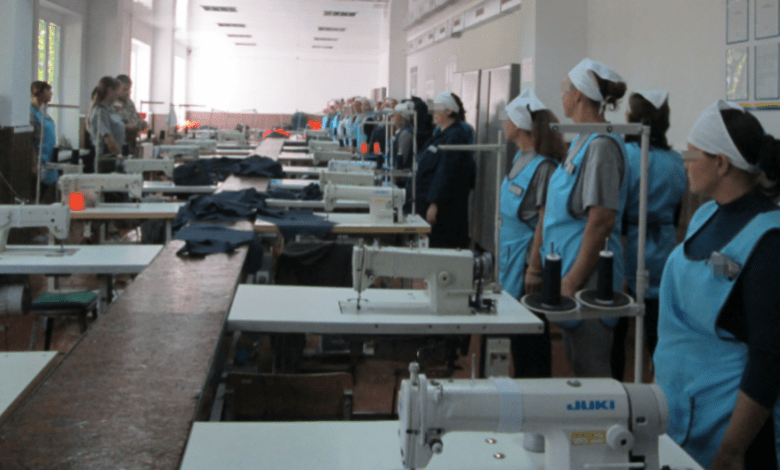How the Melitopol women’s colony lives under Russian occupation

The war in Ukraine became a test for all spheres of the country’s life. Every day we read news about the front, about occupied cities, about shelling and destruction. But another, very complex and almost invisible topic — the fate of Ukrainian penitentiary institutions that ended up in the occupied territories — is hardly mentioned. What happens to people who have already been deprived of their liberty when the state loses control over them? What are the conditions of detention, how did their fate change under the occupation? Did the authorities even have an understanding and a plan of what to do with prisons and colonies in case of war?
Unfortunately, society hardly gets answers to these questions. Meanwhile, hundreds of convicted Ukrainian citizens remain hostages in the Russian Federation, and no one knows in what conditions they are now, whether they are alive at all, or whether they have become “invisible” victims of this war. One of these institutions was the Melitopol Women’s Colony No. 144, which is still under the control of the Russian occupiers.
At the time of the full-scale invasion, the Melitopol Penitentiary held 76 prisoners, including three underage girls. On February 26, 2022, Melitopol was under occupation. But even after that, the colony’s leadership continued to perform its duties exclusively according to Ukrainian law.
Head of the institution Svitlana Pyasetska told, that the administration acted exclusively within the framework of court decisions on behalf of Ukraine. All personnel remained in place and strictly enforced the law:
“No matter what happened outside the perimeter of the institution, our staff and I served exclusively in accordance with the current legislation of our state. That’s the only way. We executed court decisions in the name of Ukraine.”
According to her, during the first three months of the occupation, there was no escape, illegal release or detention of people. The occupiers came to the institution several times, offered “help” with food, but the colony refused any contact with the invaders. The staff had everything necessary to ensure the functioning of the colony.
After the start of a full-scale war, the administration understood that it was dangerous to leave convicts in the war zone, so it began to actively look for legal ways to release at least some of the prisoners. Since the Melitopol courts were not working, they turned to the Tomakiv district court of the Dnipropetrovsk region. Documents for parole were prepared with the support of the South-Eastern Interregional Administration for the Execution of Criminal Punishments.
The court granted all the petitions submitted by the administration. During March-June 2022, 31 decisions were issued on the parole of prisoners. The women were taken out through the green corridor to Zaporizhzhia, saving them from falling into the Russian army. As of June 9, 2022, 45 women remained in the colony. Two minor girls were released early, the third reached adulthood and remained in the colony as an adult convict. At the time of Pyasetska’s departure from Melitopol, there were no minors in the colony.
But the situation finally changed in June 2022, when it became impossible to stay in Melitopol and continue to work under the conditions of occupation. Part of the staff, led by Pyasetska, left the city. One of the former prisoners, Olena (name changed for security reasons), who spent almost two years in the colony and was released only in March 2024, told reporters what happened next.
According to Elena, from the summer of 2022, the Russians began to fully adapt the colony to their legislation. Ukrainian articles were transcribed into Russian for all convicts through the so-called “courts”. At the same time, there were no special changes in everyday life – women continued to work, there was work. But communication with the outside world was completely limited. Only relatives who were in the occupied territory or in Russia were allowed to call. It was forbidden to call Ukrainian numbers.
Elena did not see the Russians bringing in new convicts. They were released only because of the decision of the Russian courts – the terms could be “recalculated” for a month, a few days or even nine months – and then they were released. But there was no parole, as before. According to the woman, the Russians behaved arrogantly, constantly used obscene language.
“For them, we were just useless”, – Olena remembers.
She said that physical violence was not used against the prisoners, but the atmosphere itself was oppressive. On March 15, 2024, Elena was released – according to the Russian decision. On the same day, she escaped from Melitopol, first returned to her native Kherson, but due to constant shelling, she went abroad. He admits that he still cannot get used to a peaceful life: loud noises cause panic, fireworks or airplanes are associated only with war.
“I really want to go home, I want to go to Ukraine. I want to believe that everything will end soon.” she says.
It is worth noting that the Melitopol colony is far from the only one that ended up under occupation. As of today, six more penitentiaries remain under the control of the Russian Federation: the Mariupol remand prison and Priazov correctional colony in Donetsk region, the Starobil remand prison in Luhansk region, the Holoprystan correctional colony in Kherson region, the Veseliv correctional center and the Primorye correctional colony in Zaporizhzhia.
In the Ministry of Justice explained, which every year develop calculations for the evacuation of convicts in the event of war or an emergency. In January 2022, such a plan was approved and transferred to all interregional administrations. But in practice, they managed to evacuate only those institutions that did not fall under the occupation.
In total, by June 25, 2022, it was possible to remove 4,628 people from 11 correctional facilities and remand detention facilities, including from Orihiv, Vilnia, Sofiiv, Kamian, Pokrovsk, Toretsk, Selidiv colonies, and the Bakhmut and Vilnia pre-trial detention centers. The evacuation lasted from one to three days.
As for those institutions that were under occupation, the Ministry of Justice could no longer evacuate them – it was not part of their authority. The ministry reported that they had taken all possible measures to evacuate the personnel and convicts, had appealed to the Ministry of Reintegration of the Temporarily Occupied Territories with a request to organize humanitarian corridors, but it is not known what the actual results of these attempts were.





